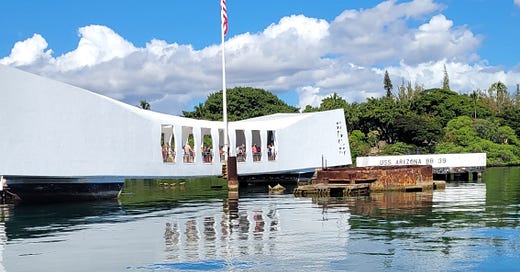Why Memorials Matter
Memorials, not monuments, provide an important window to our past
In Mission: Wanderlust, I write and podcast about our family’s travel adventures and the things that we have learned along the way.
We have visited nearly every kind of national park site in the United States. We are also big history buffs who appreciate a good war epic or biopic every now and then.
So I was shocked when my husband, who has sat through the entire HBO Pacific series at least twice, voiced hesitation over visiting Pearl Harbor while we were on our vacation to Hawaii.
He didn’t want to visit a site that was a celebration of American exceptionalism. It seems like there is a lot of that kind of rhetoric around these days and I agreed. But this was a national memorial, the site of the catalyst for our involvement in World War II. I had to believe that it wasn’t going to be that way.
And we weren’t disappointed.
Travel around the country enough, and you will be exposed to memorials and monuments of every type. Some commemorate little-known events of only local significance. Others are larger, far more conspicuous, and either remember or celebrate much bigger events. Nationwide, there are some that have come under significant critique, and for good reason. As a nation, we spend far more time painting events with rose-colored glasses than we do remembering and commemorating the events that should grieve us.
But when we do it right, it can create a lasting impact.
The visit to the USS Arizona Memorial was a somber reminder of the cost of war. The names of all of the dead etched on the wall, the open floor revealing part of their watery grave, the names of the survivors who have chosen to be buried at sea with their fallen comrades, did not strike a chord of superiority or celebration of American exceptionalism, but instead reminded me that war is terrible, no matter the reason.
Over our 2022 summer vacation, we spent time at even more memorials. We stopped at the Flight 93 Memorial, a place we had visited without our kids when it was just a walkway along the field where the plane had crashed and skidded to a halt. Nine years later, the memorial site includes a detailed museum with the history of the flight as well as a breakdown of the events on September 11, 2001. At the entrance to the national park, there is a tower with wind chimes that play forty different tones when the wind hits the tower just right. These forty “voices” represents each of the fallen citizens who fought to keep a single plane from causing more destruction in our nation’s Capitol. While our own children had no personal connection to a day that happened nearly a decade before they were born, it helped them to better understand the significance of an event that permanently changed their world.
Then we spent a day and a half exploring the fields and multiple memorials placed all over Gettysburg National Historic Park. We talked about the reasons for each memorial, the significance of remembering the fallen, and the heavy cost of keeping our country together. We pointed out the importance of remembering the past as a way to prevent making the same mistakes in the future. A memorial helps us to remember the past and honor the fallen and does not glorify an event for justification or personal agenda.
While memorials and monuments both evoke strong emotions, memorials are intended to honor while the purpose of monuments is to lift up and glorify. Some see little difference between the two, but we can even see those subtleties on the National Mall. While the words and statue of the Lincoln Memorial are meant to commemorate the lasting impact of a fallen president at the end of the Civil War, the Washington Monument is meant to serve as a geographical marker and point of reference instilling awe in visitors. There is nothing about the monument that honors and remembers our first president. Instead, it draws our eyes toward it as a symbol of architectural achievement. It is stunning and the culmination of years of planning and construction, but it serves as a good reminder of the difference between memorials and monuments and how we respond to them.
Keep this significant difference in mind as you travel the country and visit historic markers of every kind. And make it a point to travel to the memorials. Pay your respects to the fallen, not to laud them as flawless heroes but to recognize their bravery and sacrifice in a given moment.
It is a worthy use of your time and presence.





This is important. Always.
Some of my thoughts on the same: https://irasocol.medium.com/will-we-forget-9-11-have-we-already-efe7d27211d7?sk=1e3d657203dcb0b0f4714b4fff11c881
https://writenow.nwp.org/writing-monumental-memory-366472997b55?sk=43436e88ca23d4d487073a1aad375450